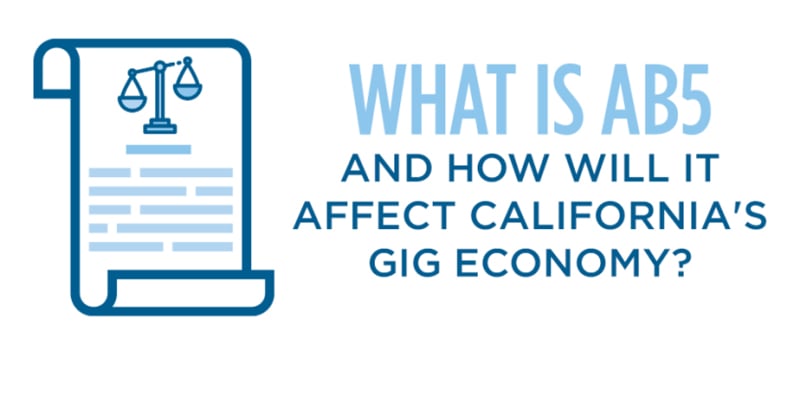What You Need to Know About California's AB5 Law
What do you know about the gig economy and the new AB5 law? Learn how the two may affect your small business in 2020.



The gig economy is the new wave of running a freelance business. But there's a shift that could spell the end of how entrepreneurs work with companies.
And it's all starting in California with the AB5 (Assembly Bill 5) law that went into effect Jan 1, 2020.
It's been all over business news lately, and it appears both sides (businesses and entrepreneurs) are upset with the new regulations.
So we're going to explore what the new law is all about and how it may impact your business.
What is the California AB5 Law?
In a nutshell, the AB5 law dictates the difference between an independent contractor and an employee. The purpose is to extend rights, benefits and protections.
And apparently, a lot of freelancers are considered employees based on certain qualifications.
This means companies will have to treat their freelancers as employees, entitling them to all sorts of benefits (healthcare, paid time off, etc.).
You'd think independent contractors would find this to be a victory. But it's going against what made their arrangement attractive to companies. Businesses typically hired freelancers to cut costs associated with hiring full-time employees.
Now that some freelancers are given an employee status, it ruins this relationship. What we're seeing now is California companies shifting away from using local freelancers who are subject to the AB5 law.
This is putting Californian freelancers out of work and, in turn, it's hurting the gig economy. And it's all because of a Matthew Taylor report that stated gig economy workers should get holiday and sick pay.

What is the Gig Economy?
The gig economy is made up of freelancers who offer services to businesses. This includes anyone who operates as their own entity, not as a full-time or part-time employee.
For example, a landscaper, babysitter, transcriptionist, web designer or even delivery service. The relationship between the freelancer and business is contractual.
The contractor provides X services for X amount of money. And the business (aka client) only has to pay their fee, nothing extra (benefits, taxes, etc.).
Contractors control when they work, how they work, and how much they're paid. Just as long as the job is done satisfactorily and on time.
Which Freelancers Are Affected By the AB5 Law?
So let's jump into the qualifications of the AB5 law. There's an ABC test to determine who qualifies as an independent contractor or an employee.
If the worker meets the following criteria, then they're an independent contractor:
- (A) The person is free from the control and direction of the hiring entity in connection with the performance of the work, both under the contract for the performance of the work and in fact.
- (B) The person performs work that is outside the usual course of the hiring entity's business.
- (C) The person is customarily engaged in an independently established trade, occupation, or business of the same nature as that involved in the work performed.
This means companies like Lyft and Uber must classify their drivers as employees, not independent contractors. All in the name of preventing misclassification of workers (resulting in $7 billion loss in payroll tax revenue).
Here's a look at some of those affected by the bill:
- Doctors
- Insurance brokers
- Architects
- Engineers
- Lawyers
- Dentists
- Private investigators
- Commercial fishermen
- Salespeople
- Investment agents
- Real estate agents
- And journalists who write more than 35 pieces per year
So if you were planning to hire a freelance writer to write weekly articles posts, then you're going to have to dish out some benefits.

What this Means for Newly Classified Employees
Alright, so we have millions of freelancers who now qualify as employees. Because of this, their "employers" will now have to offer certain benefits.
This includes:
- Workers' compensation
- Minimum wage
- Paid sick leave (and family leave)
- Right to join a union
- Unemployment insurance
- Expense reimbursement
Not to mention, the business will also have to pay 50% of the employee's Social Security tax.
So Why Does this Matter to Your Small Business?
Well, if you're planning to outsource projects and tasks, then it matters very much. Especially if you're looking to hire independent contractors in California.
Traditionally, this route was cheaper because the contractor paid their own taxes, and you didn't have to worry about paying other benefits. However, if they don't pass the ABC test, then you'll have to classify them as an employee.
So just be aware of who you're hiring and whether or not they pass the ABC test.
Prepare Your Small Business for the Future Gig Economy
Small businesses thrive on the gig economy. Chances are you're managing smaller budgets, which can cut into the number of workers you can hire.
Freelancers are still an excellent solution for getting tasks completed at reasonable rates. The way you go about it will have to change, though.
So stay abreast of the changes in the laws surrounding the gig economy to ensure you're not breaking any regulations!

%20(1)%20(1).png?width=340&name=Group%2012%20(2)%20(1)%20(1).png)
